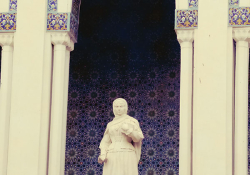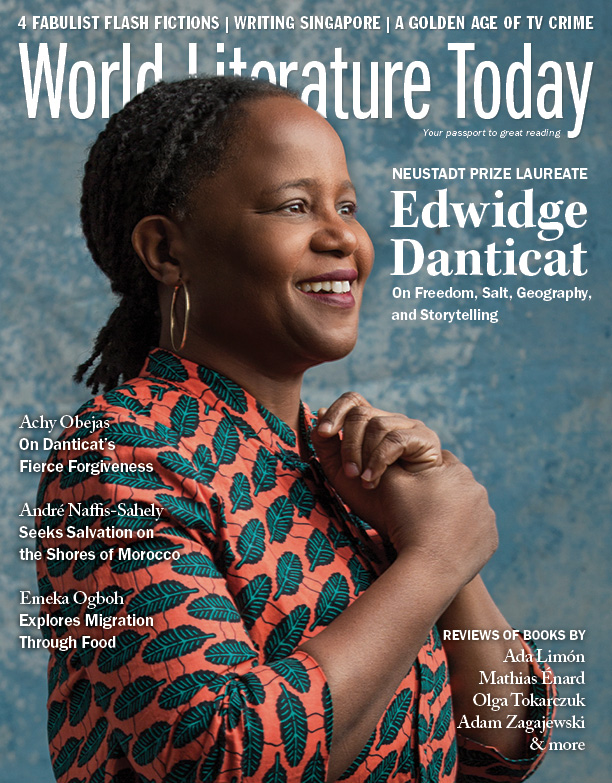A Mother’s Bread: An Interview with Nariman Hasanzade

The following interview accompanies the excerpt from Auntie Nabat’s Bread that appears in the Winter 2019 issue of WLT. Poet, playwright, and journalist Nariman Hasanzade was born in rural Azerbaijan in 1931. His works address love, Azerbaijani history, folk traditions, the roles of women in society, and the natural world. The author of dozens of poetry collections, in 2005 he received the national lifetime achievement award, “People’s Poet of Azerbaijan.”
Shahla Naghiyeva: Your fictionalized memoir Auntie Nabat’s Bread reads as a young writer’s coming-of-age story in mid-twentieth-century Soviet-era Azerbaijan. How do things compare for young people growing up in your country today, especially for those who want to be writers?
Nariman Hasanzade: It’s absolutely different—the lifestyle and lives of the youth of the Soviet period and the youth of today are quite different. These differences are rooted in the fact that the society itself, the structure of the society, the attitudes of the youth toward life itself, and even their sense of morality have completely changed. Today’s youth are very aware. In my day, youth were very pure, very uncomplicated—even naïve, I would say. They believed everything they heard, whereas today’s youth believe nothing. It is a tragedy, this skepticism, for belief is a sign of purity. Although believing has its shortcomings, it is also holy. I think this lack of belief today comes from the European youth. In one of his interviews, Marx said: “I am highly suspicious of human beings.”
Differences between the youth of my day and today’s youth are also clear in their family values. For example, I could never have imagined that a son or daughter would move their elderly parents to a nursing home. Once, I heard an elderly father complaining that although he had brought up seven kids, these seven kids were not able to take care of one person—their father. Whether in Europe or in Azerbaijan, I condemn people who could act this way. The morality of human beings is now ruined. Love of people for one another is now destroyed. Now, if someone does something as a favor, he or she expects something in return. It is a tragedy. Because the more people contribute to their society, the more powerful and wonderful they become. Few people now wish that God would grant them a longer life in order to serve others.
Nevertheless, today’s society, with its highly developed technology, has advantages. For example, when I was a student in the city, every minute I wished I could know what my mother was doing, where she was, how she was doing in our small village. But I could not easily contact her. But now—you have your mobile phone in your hand and you can easily contact people in remote places. It’s a fantastic service.
But all progress has its drawbacks. For example, a man may want to see how life is on Saturn. It’s his will, and so, to achieve his goal, he might do anything. But why should he kill a person near him just to achieve this distant goal? I see no greatness in such efforts. A person should seek to discover what the people near them have in their hearts rather than travel to faraway Saturn. For although they might discover life on Saturn, they don’t see the inner worlds of the people right around them.
Throughout history there has been a generation gap between the young and old. The young people think that they know more than the older generation; they think that the knowledge their elders have is out of date. And the older generation hesitates to rely on the younger generation; they are not optimistic about the youths’ capabilities in dealing with the world around them. The older generation worries whether the youth will be able to rule the country well, handle the people’s problems, manage everything. In fact, each generation believes that they, themselves, are best suited to run things.
Naghiyeva: You are primarily known as a poet. Can you talk about your choice to write a memoir in prose? What was the incentive—in the 1970s? What were the challenges of writing in prose versus poetry?
Hasanzade: I don’t know why I wrote this novel [based on my life]. I was planning to write a long poem on this topic; I did not write it—it was born!
I was working as the head of the poetry department for the national literary magazine Edebiyyat. I wrote this book as a series of notes, a kind of daybook. Once I finished, I gave it to the head of the criticism division for the magazine, Akif Huseynov, to read and offer his feedback. Maybe a month passed, but he did not return my notes. When I asked about it, he promised to bring the notes the next time we met—but, still, he did not.
After a long period, he brought me the printed volume of the magazine where my notes were published in their entirety. I was surprised and felt quite shy. I told him that I had not written that piece for publication. He answered: “It is better that you did not write it to be published. Don’t touch a line!”
After that I hid myself and did not go out for a week. It was very strange. I had just copied down my feelings. For me, as a poet, it is easier to write my feelings in the form of a poem—not in prose. It is usually very difficult for me to make up prose sentences, but for Nabat’s Bread I did not deliberately craft prose sentences—I just wrote as it came to me, as I thought. I did not polish my sentences. If I had done so, I don’t think the book would have the powerful impact it has. Interestingly, the Azerbaijani national writer Suleyman Rahimov read the novel and said, “You have written a telegram, not a novel. Work on it and make it a long novel; there is much in it.”
Later, the book was published in Moscow, translated by a well-known Russian poet, Kozlovski. It was read on Moscow radio, three times. One review said: “It is a diamond; it should be presented like a diamond by protecting the spirit of the author.” The publisher Molodaya Gvardiya offered me a contract for another novel. They even promised me an advance on my royalties. [Nariman, however, never wrote another novel.]
The Azerbaijani poet Flora Khalilzadeh said, “This poet has written only one piece of prose and it is recited everywhere.” It has been translated into eight languages, and now English will be the ninth.
Naghiyeva: You have experience navigating great changes in your lifetime—from the small village of Poylu to large cities of Ganja, Baku, and others in the world; from the Soviet period to today’s national government; from the era of the typewriter to that of the computer. As a poet, what helped you move through so many local and global shifts in place, politics, and technology?
Hasanzade: Many changes have happened. Warm and cold impressions replaced one another in me from the Soviet period up to now.
It is the age of science and technology. It has good sides—as I have said, now I can contact any person at any time. But the past has a kind of holiness, or virtue, that even I cannot explain. Today the attitudes among people have become complicated: people do something good for one another only to expect something in return. People were morally richer in our youth. My own university professor, a famous short-story writer, Mir Jalal Pashayev, gifted me the apartment that was given to his son by the government. His own son was not planning to marry anytime soon, while I was. But Mir Jalal never mentioned this in front of others.
Now, people, including me, are always in a hurry. Where do they hurry to? We have shortage of time; we always complain about it. We plan our life with our eyes on our watches. How difficult it is to lead such a life! Human life is becoming shorter. Our lifestyle is very hard. In my younger days, people would go to Mecca and spend a year on the road, but now the people, with their tasbih—their prayer beads—in hand just get on the plane and go to Mecca for a few days and return. With little effort or time, they become Haji. It seems very strange that they don’t really experience their own feelings as people once did. People live on the run. It is impossible to live today without running, and living while running is very difficult.
There is nothing with such power to change and influence people, to encourage them to live, except literature—especially poetry.
Naghiyeva: What do you think is the role of literature, and especially poetry, in today’s world?
Hasanzade: For me, the role of literature is unique, there is nothing with such power to change and influence people, to encourage them to live, except literature—especially poetry. Nothing can compare with the influential power of literature. So, the world should be run by literary people, by writers. If this were the case, humanism would be victorious throughout the whole world.
Naghiyeva: And, on that note, what advice do you have for younger writers, both in Azerbaijan and the world today?
Hasanzade: Once we—a famous Azerbaijani national poet Khalil Rza and I—were arguing about how best to write a poem. Khalil Rza said, “like the Russian futurist poet Vladimir Mayakovsky.” I protested, saying that Mayakovsky’s poetry was too heated, that we should instead write like the lyrical Russian poet Sergei Alexandrovich Yesenin because his poetry was tranquil and awe-inspiring.
We went to the Turkish poet Nâzim Hikmet and asked him which of us was right. He was sitting on the sofa, but he stood up and went to the window and recited, from memory, a line from a poem by the Azerbaijani poet Samad Vurgun: “How soon you grew old, poet.” Hikmet breathed deeply and then said, “You should write a poem in the language of your mother, I mean, as if you are talking to your mother. A poet talks to his or her mother and beloved gently, sweetly, not shouting.” I turned to Khalil Rza, saying, “But your poems? Many of them are too heated, you should read them in a loud tone. What about them?” He answered me, “Yes, you’re right. I wrote them so people could use my poems when they need such poems—but not Mayakovsky’s.”
We see a similar view on writing poetry in satirical writer Jalil Mammadguluzadeh’s My Mother’s Book, which argues for the necessity of writing a poem in the language of a mother. A poet’s work should be rooted in the milk they once sucked from their mother’s breast.
A poet’s work should be rooted in the milk they once sucked from their mother’s breast.
Naghiyeva: Any final thoughts for an English-speaking audience?
Hasanzade: I am very grateful to English-speaking people who find interest in my novel about my childhood and my mother’s life. I am thankful to everyone who helped in the translation and publishing of the novel. My mother could have been a fine lady; she could have worn a gentlewoman’s gloves like aristocratic ladies do. But it was not her luck. Through this English translation, the English-speaking world community will know my mother, her skill in baking our national “khamrali” bread. They can feel and smell the bread [bread is sacred in Azerbaijani culture and symbolic of life]. Perhaps my mother could not be a lady wearing expensive gloves, but the ladies of the English-speaking world will read about her bread and my mother’s spirit will rejoice.
As a child, I always saw my mother to go to bed; but I never did see when she got up. I always woke to the morning star in the sky and my mother’s fire to bake bread. My mother used to buy a sack of flour for sixteen rubles and bake bread. Sale of that bread would give her twenty rubles, so her earnings were four rubles per sack. Recently, I went to the city of Ganja to an acquaintance’s funeral. The smell of the bread they served with the meal took me back to my childhood. It reminded me of the taste of my mother’s bread. Sadly, I never experience this taste in Baku. Our mouths have lost the ability to really taste.
Poylu—the small village where I was born and grew up—holds a special place in my life and memory; it is unforgettable. I have written a poem that answers your question about final thoughts, entitled “What I left behind in Poylu . . .” For, I left there that small cottage and the banks of the Kur River, and when I visit these places I meet again my purity, my dignity, my childhood, my conscience, my generation.
September 2018
Edited by Alison Mandaville
Editorial note: Five Azerbaijani women poets appeared in the March 2016 issue of WLT. Alison Mandaville is a poet and associate professor of English at Fresno State University.












